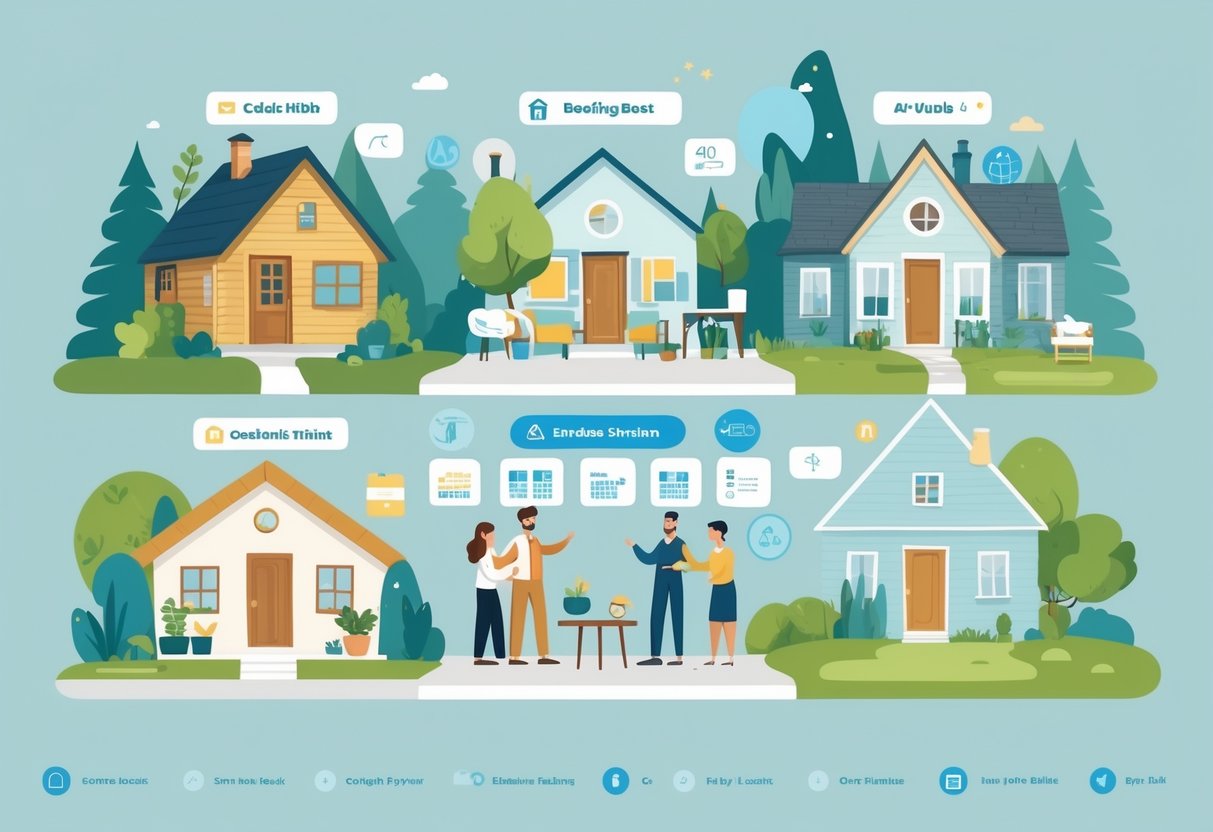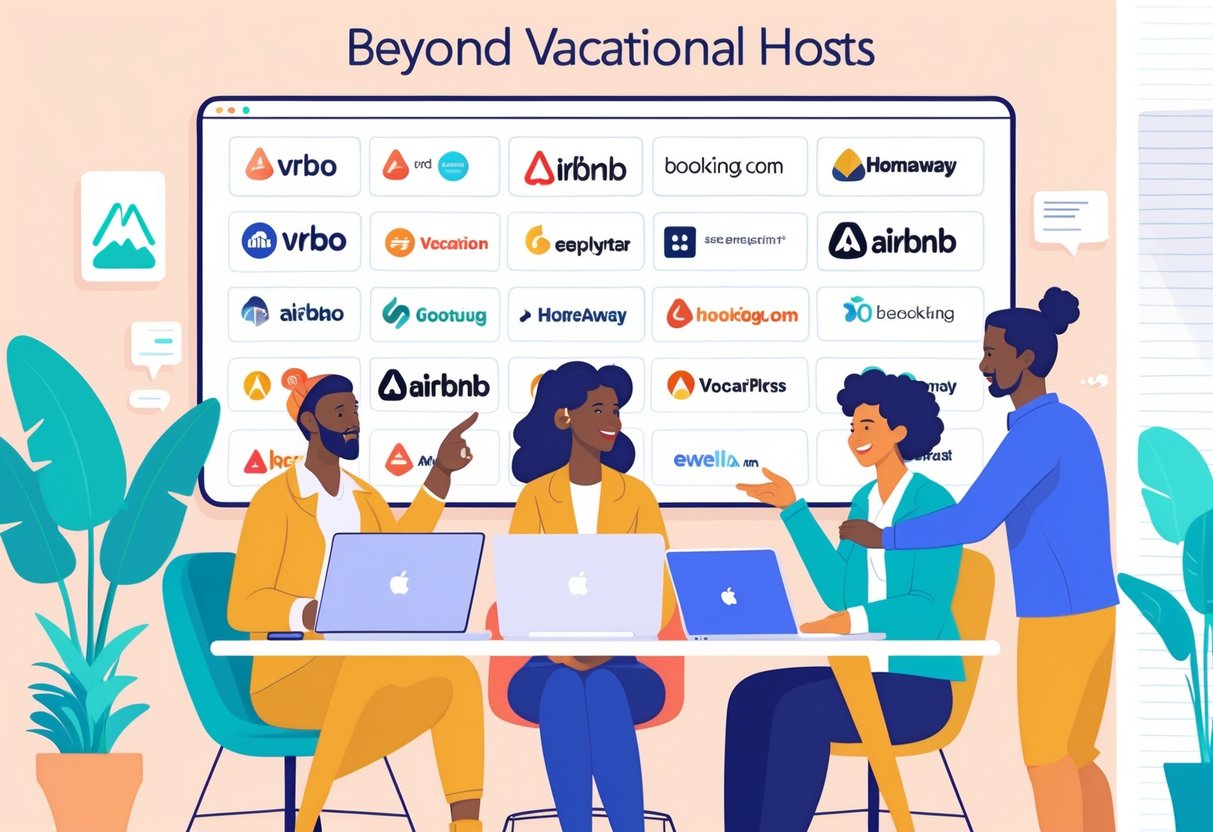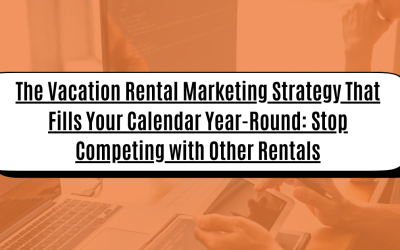A lot of hosts stick with Airbnb for bookings, but honestly, that’s risky and limits your earning potential. The vacation rental market is packed with alternative platforms—many with lower fees, different audiences, and features that could boost your bookings and revenue.
From luxury-focused platforms like Plum Guide to family-oriented options like Vrbo, these sites help hosts diversify their income streams.

The global vacation rental industry hit $89.32 billion in 2023. There are tons of platforms fighting for both hosts and guests.
Airbnb still dominates with over 7.7 million listings, but platforms like Vrbo, Booking.com, and specialized sites each offer something different. Some have lower commissions, others attract premium guests, and a few focus on longer stays.
If you put all your bookings on one site, you’re taking a big risk. Spreading listings across multiple channels helps you dodge sudden policy changes, reach new traveler types, and fill your calendar year-round.
But picking the right mix of platforms? That’s where things get interesting—and a little tricky.
Key Takeaways
- Hosts can lower risk and boost revenue by listing on more than just Airbnb.
- Each platform serves its own crowd, from luxury seekers to big families.
- Picking platforms based on fees, markets, and booking styles is smart for maximizing earnings.
Why Consider Airbnb Alternatives as a Host?

Leaning on just one platform? That’s a gamble. Exploring multiple platforms can reduce dependency on Airbnb and open up new revenue streams.
Limitations of Relying Solely on Airbnb
Airbnb’s dominance comes with its downsides. The platform takes a 3% host service fee plus extra processing fees—those add up.
Algorithm changes can bury your listing overnight. Some hosts see bookings drop out of nowhere when Airbnb tweaks its search or policies.
One guest complaint or a policy slip-up? You could find your listing suspended, sometimes for good.
You also lose a lot of control over pricing. Airbnb’s Smart Pricing tool often suggests rates way below market value, especially during peak season.
Strict cancellation policies and guest-friendly resolutions mean hosts sometimes eat the cost of last-minute cancellations. That stings.
Benefits of Diversifying Platforms
Diversifying booking channels gives you more income streams and less stress about policy changes. Each site brings in different guests and booking patterns.
Vrbo is all about whole-home rentals—great for families and longer stays, which means less turnover.
Booking.com puts your place in front of hotel bookers, not just vacation rental hunters. The platform reaches 220+ countries and territories.
Some sites charge 15-25% commission, while others keep fees lower. That can make a real difference in your bottom line.
Specialized platforms like Plum Guide attract luxury travelers. Hipcamp brings in the outdoorsy crowd.
Listing across multiple platforms makes your property way more visible. Guests often compare options, so the more sites you’re on, the better your chances.
Impact on Occupancy and Rental Income
Listing on several platforms typically boosts occupancy by 15-30% compared to sticking with just one. Each site fills different calendar gaps.
Diversified revenue helps you ride out seasonal swings. Maybe Airbnb is hot in summer, but Booking.com brings in business travelers during the slow months.
Different cancellation policies across platforms can help you minimize income loss. Vrbo’s flexible approach might attract guests when Airbnb slows down.
Luxury-focused platforms like Plum Guide often let you charge higher nightly rates. Some guests will pay a premium for the right experience.
Platform competition means better terms for hosts and sometimes lower fees. Sites want your business, so they’ll make it worth your while.
Some platforms are stronger in certain regions. Booking.com is big in Europe, while Vrbo really shines in North America for family travel.
Top Airbnb Alternatives for Hosts in 2025

Each major vacation rental platform has its own strengths. Vrbo is huge for whole-home, family-focused bookings, while Booking.com gives you access to a massive international crowd.
Vrbo: Whole-Home and Family-Friendly Rentals
Vrbo sticks to entire home rentals. If you have a standalone place, it’s a top pick.
Families and groups love Vrbo—they usually book longer stays and rack up higher total revenue per reservation.
Key Benefits for Hosts:
- No upfront listing fees
- Pay commission only when you get booked
- Whole properties only (no shared spaces)
- Attracts families looking for week-long stays
Vrbo’s guests are mostly families planning vacations—not business travelers. That means longer booking windows and more predictable demand.
They charge a 3% payment processing fee and a booking commission of 5-8%, depending on your subscription model. You can go pay-per-booking or pay a yearly fee.
You get solid vacation rental hosting tools: calendar management, automated messaging, and up to $1 million in damage protection.
Booking.com: Urban and International Exposure
Booking.com uses its hotel network to push vacation rentals, so you get exposure to travelers who might not even think about Airbnb.
The platform processes over 1.5 billion room nights a year. Vacation home hosts get a slice of that, especially in cities and tourist hotspots.
Commission Structure:
- 15-25% commission per booking
- No listing or subscription fees
- Hosts set their own cancellation policies
Booking.com’s global reach is wild—over 40 languages, guests from everywhere.
Hosts get analytics on booking trends, guest types, and pricing. If you keep your rates competitive and your reviews high, the algorithm rewards you.
Urban properties often see more weekday bookings thanks to business travelers.
Expedia: Bundled Travel and Global Reach
Expedia lets hosts tap into travelers booking flights, hotels, and rentals all in one go. That bundled approach can mean more bookings from folks you’d never reach otherwise.
Guests often find vacation rentals while searching for flights or hotels. That’s a huge bonus.
Host Advantages:
- Listings show up in flight and hotel searches
- Access to Expedia’s loyalty program members
- Vacation rentals get packaged with other travel bookings
- Higher conversion from qualified guests
Expedia charges around 15-20% commission per booking. They handle payments and guest messages.
Expedia’s big marketing budget covers TV and online ads. Even smaller hosts can get noticed.
Properties near airports or attractions do especially well here (not a huge surprise).
Tripadvisor Rentals: Leveraging Trusted Reviews
Tripadvisor Rentals connects your home with travelers already reading reviews for everything else. It’s a natural fit.
Their review system helps the best places rise to the top. If you’ve got great feedback, you’ll stand out.
Platform Features:
- Listings tie into Tripadvisor’s destination content
- Robust guest review system
- Commission-based pricing
- Mobile-friendly booking process
With Tripadvisor’s authority, guests often stumble on rentals while researching restaurants or attractions.
You get access to over 400 million monthly users. Standard commissions apply, but the audience is massive.
Niche Vacation Rental Platforms for Specialized Audiences
Some platforms go after specific guest types or property styles. If you’ve got something unique, these could be a better fit than the big guys.
Plum Guide: Luxury and Vetted Properties
Plum Guide is all about luxury. Only about 3% of homes make the cut.
They target travelers who want high-end stays for special occasions.
Selection Process and Standards
You need top-notch design and amenities. Listings get professional photos and have to pass strict quality checks.
Financial Structure
Host commissions run 3-15% per booking. Guests might pay up to 12% in service fees, but you can usually charge higher rates to make up for it.
Guest Demographics
These guests stay longer and expect concierge-level service. If your place is gorgeous, you could do really well here.
Homestay: Authentic Local Experiences
Homestay connects guests with local hosts for a more personal, cultural experience. It’s less about luxury, more about connection.
Hosting Model
Hosts live on-site and hang out with guests. Usually, you’re renting a private room in your own home.
Fee Structure and Costs
| Fee Type | Rate |
|---|---|
| Host Commission | 3% |
| Guest Service Fee | 15% |
Lower guest fees attract students, interns, and travelers on a budget.
Guest Expectations
People want local insight—maybe a cooking lesson, some language practice, or a tour. Stays are often longer, especially for work or study.
Blueground: Furnished Apartments and Extended Stays
Blueground runs a managed service for fully furnished apartments, mainly for monthly or longer stays.
They go after business travelers, relocating professionals, and digital nomads.
Property Management Approach
Blueground handles everything—guest interactions, maintenance, the works. Hosts get guaranteed monthly income and don’t deal with guests directly.
Target Market Focus
Business folks need temporary homes, digital nomads want reliable internet, and families want move-in-ready places.
Revenue Model
Hosts get fixed monthly payments no matter what. Blueground sets prices and handles bookings. Your place has to meet corporate housing standards.
Hipcamp and Outdoorsy: Outdoors, Glamping, and RVs
Hipcamp is for outdoor stays—campsites, cabins, treehouses, and glamping. Outdoorsy handles RV rentals.
Property Types and Requirements
Hipcamp wants nature-based listings—think campsites, treehouses, or glamping tents. You’ll need basics like restrooms and water.
Outdoorsy Platform Focus
RV owners rent out their vehicles. Motorhomes, campervans, and trailers can earn money when you’re not road-tripping. Insurance and roadside help are included.
Guest Demographics and Expectations
Campers and adventure seekers want authentic outdoor experiences. Families look for safe, comfy alternatives to tent camping.
Revenue Considerations
Bookings swing with the seasons. Rural spots may have less competition but fewer guests. Unique features and activities help you stand out.
Direct Booking Strategies for Greater Control
Direct bookings put you in charge—set your prices, talk to guests, and keep more profit. A decent website and smart marketing can help you build repeat business and depend less on big platforms.
Building Your Own Vacation Rental Website
A dedicated vacation rental website lays the groundwork for direct bookings. You’ll want real booking functionality and a professional look that actually convinces people to book.
Key website features include:
- Online booking system – Lets guests check availability and book instantly.
- Secure payment processing – Handles credit cards and digital payments safely.
- Property photos and descriptions – Highlights amenities and what makes your place unique.
- Guest reviews and testimonials – Builds trust with people considering your rental.
- Mobile-responsive design – Works smoothly on phones and tablets.
The booking engine should sync with your existing calendars so you don’t end up with double bookings. Many hosts use platforms like Hostaway or other property management systems to build a direct booking site for vacation rentals while keeping listings synced across channels.
Professional photos and clear pricing info go a long way in boosting conversions. Make sure your site loads quickly and gives guests the details they need to feel good about booking.
Driving Bookings Through SEO and Marketing
Search engine optimization helps your rental show up when travelers search for places to stay. Marketing spreads the word and gets your link in front of more eyes.
SEO basics for rental properties:
- Local keyword targeting – Use your city, neighborhood, and “vacation rental” in your content.
- Google My Business listing – Shows your place in local search and map results.
- Content creation – Write blog posts about local attractions or travel tips.
- Review management – Ask for and respond to guest reviews on all platforms.
Social media can drive direct traffic to your site. Instagram and Facebook are perfect for showing off your property with photos and video.
Email marketing keeps you connected with past guests. A simple newsletter with local happenings or a seasonal deal can remind people to come back.
Paid advertising—think Google Ads or Facebook—lets you target specific types of travelers. Retargeting ads can bring back people who visited your site but didn’t book.
Attracting Repeat Guests and Building Loyalty
Repeat guests are gold—they book directly and skip the extra marketing costs. Building loyalty takes great service and some thoughtful follow-up.
Loyalty-building strategies:
- Welcome packages – A small gift or local treat makes a great first impression.
- Personalized communication – Remember guest preferences or special occasions.
- Exclusive offers – Give returning guests discounts or early access to dates.
- Follow-up emails – Send thank you notes and invite them to book again.
A loyalty program doesn’t have to be fancy. Even perks like late checkout or free amenities can nudge people to return.
Keep a guest database with preferences and booking history. Use it to personalize future offers and service.
Post-stay surveys are handy for collecting feedback and staying connected. They help you spot ways to improve.
Holiday and seasonal email campaigns can remind guests about upcoming travel windows. Timing these around when people plan trips works surprisingly well.
Managing Multiple Platforms and Maximizing Exposure
If you list on multiple platforms, you could see up to 40% more bookings than sticking to just one. But you’ll need to keep calendars synced, adjust pricing, and have systems to avoid double bookings.
Channel Managers and Calendar Syncing
Channel managers sync your calendars across different platforms to prevent booking clashes. They update availability instantly whenever someone books.
Popular channel managers like Hostfully, Guesty, and Lodgify connect with Airbnb, Vrbo, and Booking.com at the same time.
Key features to look for:
- Real-time calendar syncing
- Automated rate updates
- Centralized messaging
- Performance analytics
Most channel managers charge $20–50 per property per month. Usually, the extra bookings cover that cost.
You can also sync calendars manually using iCal feeds. It’s free but takes more effort, so it works best if you only have a few properties.
Dynamic Pricing Tools for Optimizing Revenue
Dynamic pricing tools tweak your rates based on demand, season, and what competitors charge. They can boost your revenue by 15–25% compared to sticking with one price.
Popular dynamic pricing tools:
- PriceLabs
- Wheelhouse
- Beyond Pricing
- AirDNA MarketMinder
These tools look at local market data and booking trends, then update your prices automatically.
You can choose between strategies focused on maximizing income or just keeping your place booked.
Set minimum and maximum price limits so you don’t end up with rates that scare off guests or leave money on the table.
Minimizing Double Bookings and Cancellations
Double bookings happen when calendars don’t sync right. They lead to last-minute cancellations and can tank your credibility.
Prevention strategies:
- Use reliable channel management software
- Build in a 2–3 hour buffer between platform updates
- Block dates right after a booking comes in
- Check calendars daily for sync errors
If you get a double booking, contact the second guest ASAP. Offer alternate dates or help them find another place to keep things friendly.
Savvy hosts using multi-platform strategies often block 5–10% of their calendar as a buffer. This helps avoid last-minute cancellations and keeps things flexible.
Regular monitoring is key. Check all your platforms weekly and make sure availability matches everywhere.
Key Considerations When Listing on Airbnb Alternatives
Platform fees range from 3% to 15%, and guest verification standards can vary a lot. Business travelers often want flexible cancellation policies, while families care about safety features and kid-friendly amenities.
Platform Fees and Commission Structures
Each platform charges different commission rates, which affect your profits directly. Vrbo focuses on whole home rentals and only charges commissions when you get bookings—no listing fees.
Booking.com usually charges 15%. Plum Guide takes a bigger cut but brings in luxury travelers who spend more. Some platforms offer tiered rates based on booking volume.
Always calculate your earnings after platform fees to see what you’re really making. If your place books often, look for platforms with lower fees.
Payment schedules differ too. Some pay within a day, others might hold funds for weeks.
Guest Verification and Property Protection
Guest verification varies a ton across alternative booking platforms. Some require government ID and background checks; others just want an email.
Plum Guide goes all-in on vetting guests because of its luxury angle. Homestay is more about cultural exchange, so they might get more personal.
Property damage protection ranges from basic to full-blown insurance. Some platforms cover you up to $1 million automatically; others make you buy your own.
Read up on each platform’s damage claim process before you list. Faster resolutions and clear rules make a big difference if something goes wrong.
Security deposits can be anywhere from $200 to $2,000, depending on your place and the site.
Cancellation Policies and Occupancy Trends
Cancellation policies shape your bookings and income stability. Booking.com offers flexible options that attract more bookings but can mean more last-minute cancellations.
Strict policies protect your revenue but might turn off spontaneous bookers. Moderate policies try to balance flexibility with some income security.
Occupancy trends depend on who you’re targeting. Homelike specializes in stays over 30 days, so you get stable income and less turnover.
9flats draws budget European travelers for shorter stays. Vacasa uses dynamic pricing to fill up during busy seasons.
Keep an eye on each platform’s booking patterns so you can adjust your pricing and calendar.
Catering to Business and Family Travelers
Business travelers look for different things than vacationers. They want fast Wi-Fi, a workspace, and flexible check-in.
Homelike targets professionals booking furnished places for a month or more. These guests stay longer and usually spend more overall.
Families need safety features, kid-friendly gear, and space to spread out. Kid & Coe caters to families with children, which makes their marketing super targeted.
Safety gates, cribs, and high chairs are must-haves for family-focused sites. Properties near parks and attractions are a bonus for parents.
Play to your property’s strengths when picking platforms. Business-ready places do best on work-focused sites, while family homes shine on kid-oriented platforms.
Emerging Trends and Future Opportunities for Hosts
The vacation rental world is changing fast. New tech, shifting guest habits, and big travel sites expanding into rentals all open up new opportunities.
Role of AI in Vacation Rental Platforms
AI is shaking up how hosts run their rentals and interact with guests. Smart pricing tools adjust rates based on demand, seasons, and local events.
Automated messaging handles common guest questions and booking confirmations. That means faster replies and happier guests, without you glued to your phone.
Key AI uses for hosts:
- Dynamic pricing optimization
- Automated guest communication
- Property performance analytics
- Predictive maintenance scheduling
- Smart lock and check-in systems
Major platforms are baking in AI features to help hosts make data-driven decisions. Revenue management now means analyzing market trends and competitor prices to suggest what you should charge.
AI can handle the routine stuff, freeing you up to focus on guest experience.
Growth of Mid-Term and Long-Term Stays
Mid-term and long-term stays are getting more popular as remote work changes how people travel. Guests booking for 30 days or more usually pay more and give you steadier income.
Longer bookings mean fewer turnovers and less cleaning. You spend less time on check-ins and maintenance.
Why longer bookings are great:
- Higher monthly revenue per guest
- Fewer cleaning and maintenance headaches
- More predictable income
- Less time managing frequent turnovers
Corporate housing and digital nomads drive demand for furnished places with good workspaces and strong Wi-Fi.
If you want to attract long-term guests, offer weekly or monthly discounts. Add things like a full kitchen, laundry, and a comfortable desk setup.
The Evolution of OTAs and Travel Apps
Online travel agencies are adding more vacation rentals to compete with dedicated platforms. Google Vacation Rentals now shows listings right in search results, giving you extra visibility.
Hopper Homes and similar apps use predictive analytics to help travelers find deals and decide when to book. These new channels can bring you more bookings.
Expedia and Booking.com are pouring resources into rental tech. Their hotel know-how means hosts get access to advanced management tools.
New OTA features:
- Travel package deals
- Better search filters
- Mobile-first booking
- Loyalty program perks
Travel apps are getting more specialized, focusing on certain property types or guest groups. Listing on multiple platforms can help you reach a wider audience.
More competition means lower fees and better marketing tools for hosts. Spreading your listings around reduces your dependence on any one site.
Frequently Asked Questions
Hosts often want to know what’s out there beyond Airbnb—from budget options to luxury platforms. Each booking site caters to different property types, guest profiles, and hosting goals, with their own fees and quirks.
What are the most popular platforms similar to Airbnb for hosting guests?
Vrbo is the biggest Airbnb alternative, with over 2 million listings in 190 countries. They focus on whole homes, not shared spaces.
Booking.com has jumped into vacation rentals, offering more than 28 million listings across 220+ countries and territories.
HomeAway merged with Vrbo under Expedia Group, but still has 2 million properties and remains popular with families.
Expedia lets you list your rental alongside flights and hotels. That can get your place in front of travelers booking full trip packages.
Which websites offer a more affordable hosting experience compared to Airbnb?
Homestay charges hosts just a 3% commission per booking, which matches Airbnb’s standard host fee. Guests pay a 15% service fee—honestly, that’s lower than what you’ll find on a lot of other platforms.
9flats targets budget European travel with competitive pricing. The site really leans into affordable options across European cities.
Booking.com skips guest service fees entirely, which makes it pretty appealing for travelers watching their wallets. Hosts, though, pay a commission that can range anywhere from 10% up to 25% per booking.
Vrbo offers an annual subscription model of $499 per year instead of the usual 15% per-booking commission. That’s a solid deal if you’re hosting often or have a bunch of bookings lined up.
Are there any luxury-focused booking sites to host high-end properties?
Plum Guide accepts only 3% of submitted homes after a pretty tough vetting process. They’re all about luxury properties and premium vibes.
Plum Guide provides professional photography and listing creation for homes that make the cut. Hosts get concierge support and access to travelers who want something special.
OneFineStay focuses on high-end stays, mostly in cities. They attract travelers who want a premium experience and are willing to pay for it.
Commission rates for these luxury platforms usually fall between 3% and 15%. Nightly rates tend to be much higher, which makes sense given the market.
Can you recommend socially responsible hosting sites as an alternative to Airbnb?
Homestay emphasizes cultural exchange and community connections between hosts and guests. Their whole thing is host-led stays that actually promote cross-cultural understanding.
Hipcamp helps rural property owners and outdoor lovers connect. It’s a way to keep natural spaces thriving while giving landowners a new income stream.
Kid & Coe specializes in family-friendly rentals with a focus on traveling families. They check properties for child safety and family amenities, which is honestly a relief for parents.
What hosting services do frequent travelers recommend as a substitute for Airbnb?
Business travelers often go with Sonder for urban stays. The platform offers hotel-like consistency but with apartment perks—kind of the best of both worlds.
Homelike caters to long-term stays for business trips or relocations. You get fully furnished places and flexible lease terms, which takes a lot of stress out of moving.
TurnKey attracts tech-savvy guests who want modern amenities. It’s a favorite with professionals and digital nomads.
Vacasa keeps quality consistent across its properties. Their professional management usually means you know what you’re getting, which is honestly reassuring for repeat travelers.
How does HomeToGo differentiate itself from Airbnb for hosts seeking new options?
HomeToGo works as a meta-search engine, not a direct booking platform. It pulls together listings from a bunch of vacation rental sites like Airbnb, Vrbo, and Booking.com.
Hosts get their properties seen on multiple platforms at once. HomeToGo sends traffic straight to the listings you already have on those other sites.
The platform skips extra commission fees for hosts. Instead, it makes money through ads and referral deals with booking platforms.
HomeToGo zeroes in on vacation rentals, not business travel or shared stays. This focus connects hosts with leisure travelers who want the whole place to themselves.





0 Comments